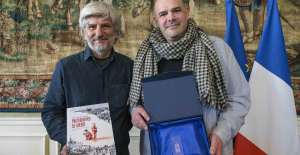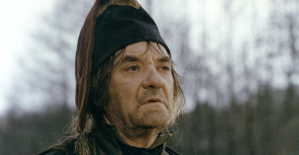Elias Canetti (1905–1994) is not known to have suffered from loss of appetite. Nothing is known about vegetarianism, veganism or fruitarianism in the 1981 Nobel Prize for Literature, yes, in his famous “Notes” he once said somewhat contritely: “This ceaseless self-abasement before Kafka: because I eat indiscriminately? (I've never really thought about what I eat).”
While such a sentence in today's time, which adheres to all possible nutritional religions, sounds completely yesterday's, almost like the confession of a mortal sin, Canetti has dealt with food and eating in his work almost obsessively - and in a radical way, the current moral and puts health apostles far in the shade.
"How is it possible that one puts a torn piece in one's mouth, tears it for a long time, and then words come out of the same mouth?" writes Canetti in a 1947 note from The Province of Man. For the moralist Canetti, eating as a vital necessity and human condition is an absurdity that is incompatible with the spiritual heights of the species. Eating always presupposes killing - be it of animals or plants - and is thus for Canetti an essential driving force in the violent history of mankind, which culminates in the mass murders of the 20th century.
The Jew Canetti, who emigrated from Vienna to London, had a similarly outraged view of factory farming and slaughterhouses as today's animal welfare activists: his ethnologically trained view saw the slaughtering and consumption of animals as a precursor to murder and manslaughter.
Even someone who eats cooked food is already a bit bruised, which is why the ideal is the complete renunciation not only of meat but of any form of food intake: "The deepest meaning of asceticism is that it receives mercy. The eater has less and less mercy and finally none. A man who does not need to eat and yet thrives, who behaves like a man mentally and emotionally, although he never eats—that would be the highest moral experiment imaginable; and only if it were happily resolved could one seriously think of overcoming death,” says The Province of Man. Radicality not for religious or health reasons, but as a moral requirement: fasting for the salvation of the soul.
In his main work "Mass und Macht", Canetti, who understood his work as a tireless struggle against the scandal of death, even suspected digestion: "The excrement that is left of everything is laden with all our bloodguilt. From him you can see what we have murdered,” it says.
How can man escape from his nature? Not at all. In 1948 Canetti wrote: "Perhaps guilt is ... the most barren thing there is. We're going to keep eating. Breathing alone, on which there are no debts, is still unspoiled and pure.” It's good that Canetti hadn't heard about the CO2 footprint.

 B:SM will break its investment record this year with 62 million euros
B:SM will break its investment record this year with 62 million euros War in Ukraine: when kyiv attacks Russia with inflatable balloons loaded with explosives
War in Ukraine: when kyiv attacks Russia with inflatable balloons loaded with explosives United States: divided on the question of presidential immunity, the Supreme Court offers respite to Trump
United States: divided on the question of presidential immunity, the Supreme Court offers respite to Trump Maurizio Molinari: “the Scurati affair, a European injury”
Maurizio Molinari: “the Scurati affair, a European injury” Beware of the three main sources of poisoning in children
Beware of the three main sources of poisoning in children First three cases of “native” cholera confirmed in Mayotte
First three cases of “native” cholera confirmed in Mayotte Meningitis: compulsory vaccination for babies will be extended in 2025
Meningitis: compulsory vaccination for babies will be extended in 2025 Spain is the country in the European Union with the most overqualified workers for their jobs
Spain is the country in the European Union with the most overqualified workers for their jobs In the United States, a Boeing 767 loses its emergency slide shortly after takeoff
In the United States, a Boeing 767 loses its emergency slide shortly after takeoff The A13 motorway will not reopen on May 1
The A13 motorway will not reopen on May 1 More than 1,500 items for less than 1 euro: the Dutch discounter Action opens a third store in Paris
More than 1,500 items for less than 1 euro: the Dutch discounter Action opens a third store in Paris 100 million euros in loans, water storage, Ecophyto plan… New measures from the executive towards farmers
100 million euros in loans, water storage, Ecophyto plan… New measures from the executive towards farmers New York justice returns 30 works of art looted from Cambodia and Indonesia
New York justice returns 30 works of art looted from Cambodia and Indonesia Les Galons de la BD dedicates War Photographers, a virtuoso album on the Spanish War
Les Galons de la BD dedicates War Photographers, a virtuoso album on the Spanish War Theater: Kevin, or the example of an academic failure
Theater: Kevin, or the example of an academic failure The eye of the INA: Jean Carmet, the thirst for life of a great actor
The eye of the INA: Jean Carmet, the thirst for life of a great actor Skoda Kodiaq 2024: a 'beast' plug-in hybrid SUV
Skoda Kodiaq 2024: a 'beast' plug-in hybrid SUV Tesla launches a new Model Y with 600 km of autonomy at a "more accessible price"
Tesla launches a new Model Y with 600 km of autonomy at a "more accessible price" The 10 best-selling cars in March 2024 in Spain: sales fall due to Easter
The 10 best-selling cars in March 2024 in Spain: sales fall due to Easter A private jet company buys more than 100 flying cars
A private jet company buys more than 100 flying cars This is how housing prices have changed in Spain in the last decade
This is how housing prices have changed in Spain in the last decade The home mortgage firm drops 10% in January and interest soars to 3.46%
The home mortgage firm drops 10% in January and interest soars to 3.46% The jewel of the Rocío de Nagüeles urbanization: a dream villa in Marbella
The jewel of the Rocío de Nagüeles urbanization: a dream villa in Marbella Rental prices grow by 7.3% in February: where does it go up and where does it go down?
Rental prices grow by 7.3% in February: where does it go up and where does it go down? Even on a mission for NATO, the Charles-de-Gaulle remains under French control, Lecornu responds to Mélenchon
Even on a mission for NATO, the Charles-de-Gaulle remains under French control, Lecornu responds to Mélenchon “Deadly Europe”, “economic decline”, immigration… What to remember from Emmanuel Macron’s speech at the Sorbonne
“Deadly Europe”, “economic decline”, immigration… What to remember from Emmanuel Macron’s speech at the Sorbonne Sale of Biogaran: The Republicans write to Emmanuel Macron
Sale of Biogaran: The Republicans write to Emmanuel Macron Europeans: “All those who claim that we don’t need Europe are liars”, criticizes Bayrou
Europeans: “All those who claim that we don’t need Europe are liars”, criticizes Bayrou These French cities that will boycott the World Cup in Qatar
These French cities that will boycott the World Cup in Qatar Tennis: “I need to regain confidence in my body,” explains Rafael Nadal
Tennis: “I need to regain confidence in my body,” explains Rafael Nadal NBA: Orlando returns to level with Cleveland in the 1st round of the play-offs
NBA: Orlando returns to level with Cleveland in the 1st round of the play-offs Tennis: Iga Swiatek in the round of 16 at full speed
Tennis: Iga Swiatek in the round of 16 at full speed “It was exceptional here in Chaban-Delmas”: Escudero looks back on the excitement around France-England
“It was exceptional here in Chaban-Delmas”: Escudero looks back on the excitement around France-England

















